In boyhood days back in Poland, as Korwin reminds Józef, the Lublin students would spy on their teachers who “went to get drunk.”
“We only watched and licked our chops, waiting till we be allowed to taste that nectar,” says Korwin, a mischievous schoolboy in the 1820s.
He adds a chortle, “Oho!”
“From that time we have drunk much of it, and we think of it differently now.”
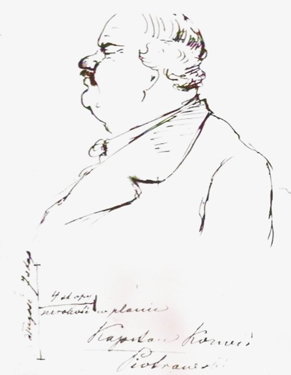
Rudolf Korwin Piotrowski sketched by Henryk Sienkiewicz
Rudolf Korwin Piotrowski, a bigger-than-life figure in San Francisco’s lively community of Polish émigrés, wrote nine letters from 1874 to 1876 to Józef Ignacy Kraszewski, a beloved author of patriotic fiction.
The sender would become the Falstaffian inspiration for Zagłoba. But his real voice has been unheard – until now.
These nine letters, together with one addressed to a Polish count in Paris, are the only surviving documents written by the forgotten 49er who raised thousands of dollars for the rebels of 1863 and greatly helped two unknowns – Helena Modjeska and Henryk Sienkiewicz.

In his florid penmanship, Korwin writes, “Kochany Panie Ignacy!” (Dear Pan Ignacy!)
In the letters, the onetime rebel captain asks the bearded writer to send books to the Polish Society of California. He writes in an ornate hand, the flowery penmanship with many a curl and flourish that both boys learned as schoolmates in boarding school.
From the Lublin school Józef Ignacy Kraszewski goes on to law school in Warsaw, then to an editorship at Gazeta Warszawska (Warsaw Gazette) and later at Tydzień (This Week). “Prolific” is far too weak an adjective. He produces more than three hundred and fifty published short stories, art reviews, political treatises, novellas and novels. Fame doesn’t help when one of his editorials offends the Russian proconsul in Warsaw. Forced into exile, he settles in Dresden.
In his first letter to Kraszewski in Germany, Korwin adroitly evokes alumni nostalgia with an apt memory from Latin lessons, Olimque unus in illis (And once one of them).
Korwin is 10 years old in 1824 when his father packs him off to Lublin, then a city of about 30,000 under Russian control in Lesser Poland. (Ten times bigger today, free at last from Russian rule, and calling itself the City of Inspiration, Lublin is about forty-five country miles from Korwin’s home town of Kamień.)
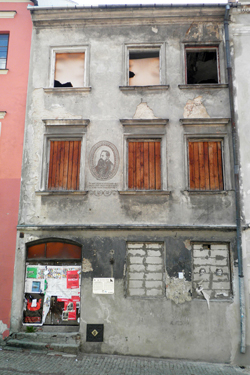
Lublin: 24 Grodzka Street
The lad is assigned to a dormitory in the Lublin Voivodeship (Province) School in what is now the touristy Old Town district. Still standing at 24 Grodzka Street is the old school, an uncharming three-story building abandoned and, except for a few legends, uninhabited. On the scabrous outer wall is a worn bas-relief profile with an extravagant beard that masks the mournful face of Józef Ignacy Kraszewski.
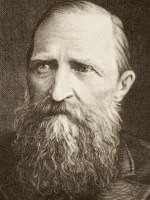
Józef Kraszewski
Józef, two years older than Korwin, can’t be expected to recall Fourth Form tadpoles. (He doesn’t.) In the first few letters, Korwin may have memory problems of his own. He addresses Kraszewski as “Ignacy” but corrects himself later with “Respected Pan Józef.”1
Twenty-nine of Kraszewski’s novels are based on Poland’s rich history of tumult and warfare. Korwin is more interested in the real thing. At 16, he joins the rebels in the November Uprising of 1830-31 against the Russian occupiers.2 When it ends in defeat, the teenage Polish lancer is awarded the gold cross for valor, promoted to captain, and compelled to leave his homeland forever. He spends sixteen years in France and two years in New Orleans, does a short teaching stint in Pittsburgh, captains a pioneer wagon train to California in 1849, and works as a miner and merchant in the Gold Rush. After he moves to San Francisco, he co-founds the Polish Society of California to proselytize for Polish freedom and to raise funds in 1863 to support the January Insurrection in Poland. He is about to retire from his post as the California Commissioner of Immigration when in 1874 he begins his correspondence with Kraszewski.
Both men are in their 60s.
Four years ahead are Korwin’s friendships with Helena Modjeska and Henryk Sienkiewicz. With her husband and others, the actress and the young author are trying (and failing) to launch a mini-commune in Anaheim. Korwin drops by.
Czesław Miłosz, the late Nobel Laureate at the University of California, sums up Korwin’s life without flattery: “A man of gigantic stature and immense strength, a braggart, a liar, a drunkard, he was also a gay personality and an excellent storyteller, drawing upon his rich experience in Poland, where he had fought in the Polish-Russian war of 1831, as well as upon his wanderings across the American prairies, his battles with Indians, etc.”
Sienkiewicz spends two years in California and a lot of time with Korwin. Back in Poland, he writes the epic Trilogy. Central to his cast of characters is Jan Onufry Zagłoba. Korwin becomes his prototype for the shrewd, fat, convivial, nectar-guzzling knight. Still immensely popular in Poland, Sienkiewicz (with the Trilogy) displaces Kraszewski as Poland’s leading author of historical fiction.
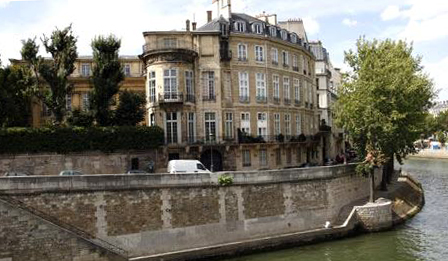
Hȏtel Lambert
Six years elapse before we hear again from Korwin. He is 68. Going blind. His last hope for restored vision is a Paris-based ophthalmologist, Dr. Ksawery Gałęzowski. And Paris holds another attraction – his daughter, whom he abandoned to her French grandparents when she was still a toddler. He wants to see her. And the grandkids, whom he’s never met.
Korwin dusts off his French and pens Letter #10, to The Prince – Count Władysław Czartoryski – a Polish nobleman, political activist in exile, and avid art collector. Briefly introduced in ’46 at the Hȏtel Lambert, Korwin hopes he’s remembered. (He is.) He reminds The Prince of his war service. He needs a favor. He’s lost Gałęzowski’s address (or never had it).

Korwin death announcement
Gałęzowski’s treatment in Paris is unsuccessful. Korwin, now blind and penniless, never learns about his literary doppelgänger, Zagłoba. Sienkiewicz back in Warsaw is ready to publish With Fire and Sword3 in 1883, the first volume of what will become his Trilogy. Rudolf Korwin Piotrowski dies in February of that year in a charity ward in Paris. Though reportedly present at his death bed, his only daughter does not spring for a tombstone. The Polish lancer is dumped in a potter’s field. Józef Ignacy Kraszewski dies four years later in Geneva, survived by his collection of letters.
* * *
Letter #14
302 Davis Street. feb. 14 /74 San Francisco, Cal.
“Olimque unus in illis”
[And once one of them]
Sincerely respected friend!
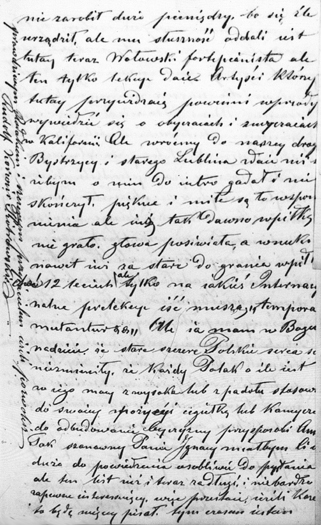 It was with great pleasure, reading yesterday your biography in the history of Polish literature, that I found you’d been en-schooled in Lublin:5 at once the memory thawed, and I recalled Ignacy Kraszewski, a Wołyń-ese like myself (for you could be esteemed as hailing from the region of Łuck), who though being a sixth-classman then, took little heed of a member of the fourth, such as I, yet if perhaps my heart should puff up, proud that J.J. [sic] Kraszewski was likewise a Lublin-ite, I determined to remind you of myself, though I impose somewhat on your time, I extend my hand sincerely, and run on a bit about our early years. I’m a couple of years younger, born in the year ’14,6 in Kamień near Chełm on the [River] Bug.
It was with great pleasure, reading yesterday your biography in the history of Polish literature, that I found you’d been en-schooled in Lublin:5 at once the memory thawed, and I recalled Ignacy Kraszewski, a Wołyń-ese like myself (for you could be esteemed as hailing from the region of Łuck), who though being a sixth-classman then, took little heed of a member of the fourth, such as I, yet if perhaps my heart should puff up, proud that J.J. [sic] Kraszewski was likewise a Lublin-ite, I determined to remind you of myself, though I impose somewhat on your time, I extend my hand sincerely, and run on a bit about our early years. I’m a couple of years younger, born in the year ’14,6 in Kamień near Chełm on the [River] Bug.
In ‘24 etc. I was in Dysiewicz’s7 dormitory, and [with] his brother Hippolyte,8 whom we called Cyclops, and who flogged us mercilessly for that as you must recall, for he was almost with your age group (he had a film over one eye). You remember the old Rector Smolikowski9 whose beautiful niece Julia, Dysiewicz married, and she was always attentive to our corporal punishments, especially when we had our pantaloons dragged off (the hickory stick, little children, etc.). I really loved her for that, for that or for something else, that was my first passion. And you remember the kindly old Neuburg,10 who always began his history lectures, hum! hum! Great Almighty God, hum, hum! “Utinam Sim falsus votes” [May I be a false prophet] that Poland should go in deriptionem gentium [as plunder]11 just as Jan Kazimierz said in the Sejm while abdicating.12
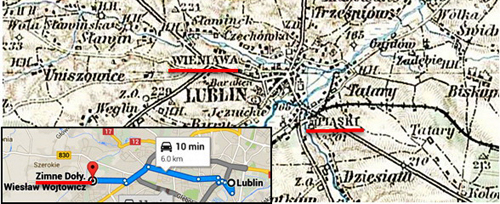 “Onward Mr. Piotrowski” and his [Neuberg’s] six stout daughters upon whom we boys then looked as goddesses, and who could forget Witalis Witkowski13 the giant, who like thunderous Jupiter quelled all of our rebellions with only the creasing of his brow. And fat Zimmerman14 with his proverb (die narren meinen auch) [fools also think] and the slight Frenchman Mons Branciard15 and his girls’ dormitory and Zdzitowiecki,16 Zubelewicz,17 Konarski, Ostrowski,18 all of whom later grew into famous persons. Niedabylski19 and so many others, and of the students the Koźmians,20 the scamp Ibuś Ostrowski.21 Lange from Górsk, Apolinary Karwowski22 (… )23 —where, where are they all now? But there I have already run on like an old woman, and I would still like to mention something about Piaski where we played ball, about Zimne Doły and Wieniawa24 where our professors Wiśniak and Miodek25 went to get drunk, but we only watched and licked our chops, waiting till we be allowed to taste that nectar, Oho! From that time we have drunk much of it, and we think of it differently now. A propos [of] Wieniawa.
“Onward Mr. Piotrowski” and his [Neuberg’s] six stout daughters upon whom we boys then looked as goddesses, and who could forget Witalis Witkowski13 the giant, who like thunderous Jupiter quelled all of our rebellions with only the creasing of his brow. And fat Zimmerman14 with his proverb (die narren meinen auch) [fools also think] and the slight Frenchman Mons Branciard15 and his girls’ dormitory and Zdzitowiecki,16 Zubelewicz,17 Konarski, Ostrowski,18 all of whom later grew into famous persons. Niedabylski19 and so many others, and of the students the Koźmians,20 the scamp Ibuś Ostrowski.21 Lange from Górsk, Apolinary Karwowski22 (… )23 —where, where are they all now? But there I have already run on like an old woman, and I would still like to mention something about Piaski where we played ball, about Zimne Doły and Wieniawa24 where our professors Wiśniak and Miodek25 went to get drunk, but we only watched and licked our chops, waiting till we be allowed to taste that nectar, Oho! From that time we have drunk much of it, and we think of it differently now. A propos [of] Wieniawa.
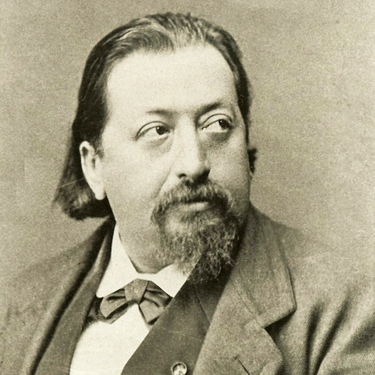
Henryk Wieniawski, violinist
There was an artist here Wieniawski,26 a violinist, I was very happy with both his talent and his technique, he didn’t make a lot of money because he managed things badly, but justice here has given him better now than it has to the pianist Wołowski27 but he only gives lessons. The artists who come here ought to inquire beforehand into the customs and habits in California. But let us return to our dear [River] Bystrzyca and old Lublin, it seems I could ramble on about this until tomorrow without being done, these memories are pleasant and beautiful, yet it’s been so long since we played ball, my head has turned gray, and my grandchildren28 are already too old for playing ball though at the age of 1229 but they must only attend some kind of international lectures, “tempora . . . mutantur” [times . . . are changing]. But I have hope in God that true old Polish hearts haven’t changed, that every Pole to the extent of his strength, from the heights or the vale, appropriates to his ability brick or stone in preparation for the rebuilding of our country. Amen. So esteemed Pan Ignacy I would have much to say, personally to ask, but this letter is already too long and certainly not too interesting, so I stop [but] if [you] bid me…30
as a true Pole and respected friend if you allow.
Rudolf Korwin Piotrowski
Letter #2
April 6/74 San Francisco
Dear and esteemed Pan Ignacy,
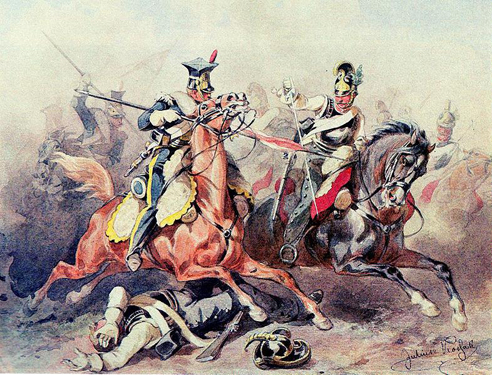
Polish lancer in battle
Your letter of March 9 gave me greater pleasure than long have I experienced, for it reminded me of a friend and neighbor from long ago. After all, at the time when you were with Ostrowski I was nigh with Niedabylski, and I was in the sixth class, and you were with the young Miss Świdzińska to whom I made eyes even [though] she was my kin.31 So I expect that now, to the extent that your valuable time will permit, we will regularly correspond like old schoolmates. Korycki32 was with me at Dysiewicz’s, and there I stayed. You desire my curriculum vitae. Well, here it is.
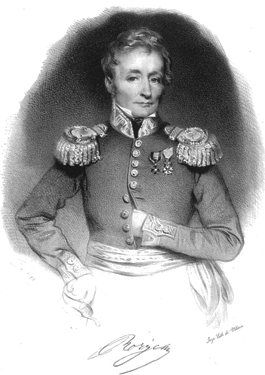
Gen. Samuel Różycki
I was with the Guards in Warsaw for two years, in the revolution33 a second lieutenant in the Parczewski Regiment,34 later a lieutenant from Kuszel’s35 [Regiment] and in the 4th Uhlans36 After returning from Lithuania with Gen. Różycki37 after crossing into Galicia I was discharged as a captain with a gold cross38 and I was interned in Iglau39 with my father, then a Colonel, and together we escaped [and] fled to Dresden rather than surrender to the Muscovites as desired by Kotzebue.40
Notwithstanding the poor old fellow did not escape his fate, as after the Hungarian war, where he was with Bem,41 returning to Galicia he was captured there, turned over to the Muscovites in Kielce, and sentenced to death. After nine months imprisoned in chains, badly wounded, he died shortly thereafter in the hands of my sister Cichorska.42
I was in France in the general staff school, then a wine merchant, for I could not serve in the army, not being a Frenchman. I married and after the death of my wife I wandered to America in ’44.43 I congratulate you warmly on your grandchildren and from the depths of my heart I bless them, but I also have three lovely girls by my only daughter, yet I don’t know them and I know not if God will allow me ever to see them, I am not rich, for as a nobleman I don’t know monkey business and I’m a rookie at politics, and such means here are for the making of fortunes, and so what’s most likely to be true is that I will not voyage in my old age. I have truly good and powerful friends here, who have made me Commissioner of Immigration

Rudolf Korwin Piotrowski’s signature
This is rather a good piece of bread while it lasts, because you know there is a change of government here after the Republicans, but anyway God will manage. Now I had only to write you a few words about myself, and here I’ve run on like an old woman, so forgive me my dear Pan Ignacy these scribblings, but believe that I sincerely love and respect you and that I’m always ready to be in your service only bid me as your true
Countryman and Friend
Rudolf Korwin Piotrowski
PS. In the next letter if you want to know something of California tell me or physically write, then I will inform you of everything, because I’ve been here since the year 49. Our Poles here all dearly love you and glory in you, especially Dr. Pawlicki44 as a Wołyń-ese. The books arrived; merci; the Poles who received those books officially thank you.
Letter #3
Office of the Commissioner of Immigration
No. 302 Davis Street, San Francisco, Cal.
1. Decembra45 1874
![]() Respected Pan Ignacy!
Respected Pan Ignacy!
I take this occasion (as it was said of yore) to send you, esteemed friend, by special messenger, over land and sea, by iron conveyances46 the letter here enclosed to you [for] Sir Roger and Wentworth and Łubieński,47 who a month or more ago hence to Europe departed; I would have told you a story here of Cervantes48 or Calderon49 about a traveler of many names, but of course you have better knowledge than I, so this letter Dr. Pawlicki recognized was of your hand, so I return it to you. If however there was some mistake in this do the kindness of sending it to Warsaw. This is my messenger. With regard to the occasion that happened it gives me the opportunity once again to remind you that I have not received an answer to my last letter.
But I know that your time is short and dear, so I ask but for a few words, for this greatly pleases the heart of an old mate from Lublin. But with us old ones here sincere joy is rare but a letter of yours Pan Ignacy will bring it to me.
Now I would like to ask you in the name of our Association,50 which duly loves and honors you, that you would be so gracious as to send us any manner of accounts, so that we could somehow do our yearly reckoning. Our former worthy secretary A. Elgass51 has been obliged to work for the local government so the Association has laid on me the pleasure of writing to you. To conclude I have yet a personal request for you. Which is that you would be so kind as to tell us your opinion and that of the foremost Poles in Europe regarding the current state of affairs and the future of Poland, in the event God willing, of a war between Russia and the Germans – to which there is great likelihood at this time. What ought Poles to do domestically and abroad? And this is seemly, or even an obligation of you who have great minds and pens, to clarify this matter to Poles and prepare the nation not to be captured[,] captured as usual in the hour of need, well intentioned but without weapons or a head! As you will receive this letter around the New Year so accept from me and all of our Countrymen here the sincerest wishes for everything to be as you would have it. That only we might once again on Grodzka Street52 congratulate one another and in brotherly fashion could embrace each other in a free Poland. Amen! Pardon my scrawling such a long letter to you, but in the name of old Ostrowski and Neuburg I expect that you’ll excuse me. Wiktor Osławski53 is in Paris[,] of the others I know nothing. Be well
and know that your old schoolmate
is your true and sincere
friend and servant
Rudolf Korwin Piotrowski
Letter #4
20/1 –75 San Francisco
Dear Pan Ignacy!
Your letter, respected countryman, of December 23, we received and greatly thank you for it. If you knew, Dear Pan Ignacy, how much joy and good fortune your correspondence has brought us, then I’m sure that, despite your many and important occupations your good heart would incline you to write us more often. Your opłatek54 was shared with great celebration when we sat in solemnity and not only as a religious tradition, but as a pledge to our Nation and to our future liberty[,] it was consumed by all[,] I thank you for your remembering us
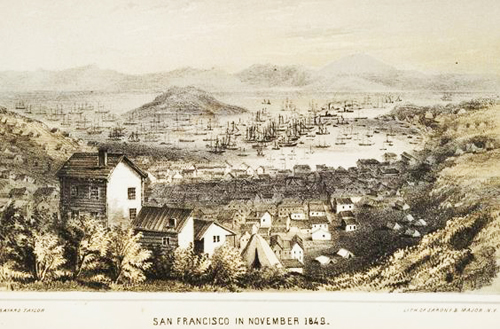
San Francisco in November 1849
Now regarding the business matters you write esteemed Pan Ignacy, that you have what55 suffices for our debts. We fear you are mistaken and that despite old Ostrowski’s toil and trouble you don’t stand as high in arithmetic as in literature as all the world knows. For we must be indebted enough to you already for just the Warsaw and Poznań newspapers not counting the books. In none of your letters have you mentioned the newspapers. Be so gracious in the future as to write of everything, including money, for keep in mind after all that we have come here to California for gold and silver. Speaking of gold and silver it’s occurred to our compatriots here that a description of California privately by an eyewitness more in the way of anecdotes and a history of the beginning of the settling of local Pioneers (not a regular history of the country56 for such a printed one you will easily get) could be useful, if only as a trifle. If such is the case though the bald Dysiewicz made a poor writer of me, I will nevertheless do what I can and what I might contrive as I arrived in California across deserts by land in the year of 49, I worked with my own hands[,] I raised cabins of which a city larger than Warsaw has been made and I saw with my own eyes grey bears paying us wild visits in the cabins[,] turning back to what I saw that is most strange but true as the Gospels[,] [A]nd every day I see cobblers and simple bartenders who a few years ago were selling vodka for five cents a shot riding today in carriages, living in palaces worth 50 to a hundred million of our dollars.
 There is here a certain Capt Lessen,57 who is an agent of the government on the islands, of furs on the Bhering sea [sic]. He could also write you interesting enough descriptions of those islands and inhabitants[,] wildlife and commerce. So give the word and we shall be of service, and maybe, though from our work you will make but a single little brick, you will add it to your undying monument to posterity. I close with an expression of heartfelt friendship and deep respect.
There is here a certain Capt Lessen,57 who is an agent of the government on the islands, of furs on the Bhering sea [sic]. He could also write you interesting enough descriptions of those islands and inhabitants[,] wildlife and commerce. So give the word and we shall be of service, and maybe, though from our work you will make but a single little brick, you will add it to your undying monument to posterity. I close with an expression of heartfelt friendship and deep respect.
Your Rudolf Korwin Piotrowski
Letter #5
25 May 1875
Respected Mr. J I Kraszewski,
I received your letter of Apr 4 of this year and communicated it to the company at our meeting on May 8. So instanter58 the Polish Society of California with one voice resolved. To send you respected countryman, for so many years of service to Poland,59 and for your numerous proofs of friendship for us here and as a token of our sincere respect a walking stick of California materials: (from the manzanita tree) as a small memento which should support you Dear Pan Ignacy physically and morally. – Physically: So that that hand which so long and gloriously has fought and fights for liberty and nationality might rest a while on that support.
Morally: so that however many times you lean on this staff that we warmly offer you, so many times will you remember: that not only in Poland, not only in Europe, but even on the other side of the world on the Pacific Ocean, there live people whose hearts beat like yours. Who are able to value the service of those who for freedom and country struggle and suffer. Dear Friend It’s a pleasure for me to have been selected by our Society as the interpreter of our feelings to send you this small memento. Excuse the editing. For although I was in Corinth (read in Lublin) nevertheless there were few Kraszewskis there. So Dear Pan Ignacy, read in our hearts and not on the paper – now
Vale et nos ama [Goodbye and love us].
Rudolf Korwin Piotrowski
Letter #6
Augusta60 23/75
Respected Countryman!
We received your letter of July 20, and in it we read that you thank us for the small trifle we sent you in appreciation of your service to Poland.61 But when all is said and done Mr. Kraszewski you have no need whatsoever (especially for anything so small) to thank us. But isn’t it the sacred duty of every Pole to love Poland and [to] respect its most splendid servants and defenders?
And so the Poles of our Association in California claim to be good Poles. And Ignacy Kraszewski has been unfailingly one of Poland’s worthiest sons.
Receive again respected countryman the expression of our deepest respect and do not thank us but love us a little!
In the Name of the Society
secretary of correspondence
Rudolf Korwin Piotrowski
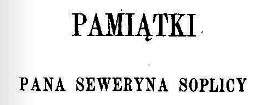 PS We received your books dear Pan Ignacy and we thank you greatly for them but you left out volume 6 of Kaczkowski62 which we don’t have So don’t forget about it in your next parcel If you can send us Memoirs of Mr. Seweryn Solipcy by Rzewuski[,]63 the Fundraiser’s Memoirs (and a few other works by Chodźko[)].64 the Third volume of your Three Partitions of Poland65 and some kind of fairly good history of Poland then you would do us a great favor. It’s understood that everything you yourself write is most desired. Send now for me personally a photograph of yourself and those closest to you and you’ll bring happiness to an old schoolmate and friend.
PS We received your books dear Pan Ignacy and we thank you greatly for them but you left out volume 6 of Kaczkowski62 which we don’t have So don’t forget about it in your next parcel If you can send us Memoirs of Mr. Seweryn Solipcy by Rzewuski[,]63 the Fundraiser’s Memoirs (and a few other works by Chodźko[)].64 the Third volume of your Three Partitions of Poland65 and some kind of fairly good history of Poland then you would do us a great favor. It’s understood that everything you yourself write is most desired. Send now for me personally a photograph of yourself and those closest to you and you’ll bring happiness to an old schoolmate and friend.
Tout á Vous [Sincerely Yours] R Korwin Piotrowski
Letter #7
September 8, 187566
Beloved Pan Ignacy!
Not long ago I wrote you officially from our association[,] allow me to write a few words today from an old schoolmate and friend. In your last letter to us we saw your splendid heart, but you wrote nothing either about your family, which I am much interested in, or about your health, your work and your hopes. So I beg you to make amends in this respect at a suitable time and write a few words to me not to the association I ask you as well if possible for a photograph of you and yours. Pawlicki has one and I’m jealous. Please also do for us … [page is cut off]
[ . . . . continued, after a missing segment.] . . . . among other books Always Them by Suffczyński67 In any case he’s likewise a Lublin-ite68 if that’s the fellow I knew and at whose place I more than once spent the night with my father in Łańcuchów on the [River] Wieprz. (God bless that country.[)] Regarding the packages I must inform you that regular shipping is expensive here. But from the time of the postal Congress in Geneva69 mail is far cheaper and so a two-pound package costs 32 of our cents. But the package shouldn’t weigh more than 2 pounds : three ounces maximum and it should be open at the ends so that the books and papers are visible then it will surely and quickly and cheaply reach us. So if it wouldn’t be too much work for you then send the books in such small packages addressed to me by regular mail.
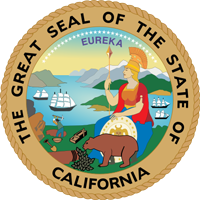 We’ve had elections here, which would be a big event in Europe[,] they took place yesterday in the most peaceful manner, not one drunk on the street and only one fight and equally the Democrats won, that is they beat the Republicans which is to say they changed the whole administration. For this is a free country. A week ago the Bank of California went bankrupt[,] people are saying it’s 8 or 10 million of our dollars which is twice as many guilders. The Banker W C Ralston drowned himself70 and similarly no one is afraid for business[,] other Banks are paying as usual, and this in the city where I myself saw scarcely 150 cabins 25 years ago. I would like to write you something more about this country, but I’m afraid I’ve already scribbled too much about things that certainly do not greatly interest you so
We’ve had elections here, which would be a big event in Europe[,] they took place yesterday in the most peaceful manner, not one drunk on the street and only one fight and equally the Democrats won, that is they beat the Republicans which is to say they changed the whole administration. For this is a free country. A week ago the Bank of California went bankrupt[,] people are saying it’s 8 or 10 million of our dollars which is twice as many guilders. The Banker W C Ralston drowned himself70 and similarly no one is afraid for business[,] other Banks are paying as usual, and this in the city where I myself saw scarcely 150 cabins 25 years ago. I would like to write you something more about this country, but I’m afraid I’ve already scribbled too much about things that certainly do not greatly interest you so
Vale et me ama [Goodbye and love me]
Rudolf Korwin Piotrowski
Pawlicki first and all the others send the warmest fraternal greetings.
Letter #8
San Francisco Augusta 6th 1876
Respected Pan Józef!
At the order of our Society, I have the honor of informing you that last month by your good graces we received 20 books. For this and for your trouble we thank you very much, and we promise to most fervently ask of the Lord God that He reward you abundantly, because we ourselves will certainly never manage to accomplish this. Let, however, your own heart, love, and the respect of your Countrymen, which you so eminently possess, be paid in earnest at least on the debt that Poles and Poland owe to you. Let me take this occasion to express to you here my
personal respect and the friendship
of an old schoolmate and servant.
Tout á Vous [Sincerely yours]
Rudolf Korwin Piotrowski
550 Stevenson Street, San Francisco
- List of Books received ([Total:] 20)
- Volumes 6 and 11 of Kaczkowski71 (2)
- Brühl72 (2)
- From the Seven-Year War73 (2)
- The Dying74 (2)
- Resurrection75 (2)
- Heart and Hand76 (2)
- Diary of Serafina77 (1)
- Memoirs of Cieszkowski78 (1)
- Scenes from the Sejm79 (2)
- In the Autumn80 (2)
- Of Prince Radziwiłł as a Guest81 (1)
- His Final Hours82 (1)
Letter #9
San Francisco 10/3/76
550 Stevenson Street,
![]()
Respected Pan Józef!
!["Towarzystwo Polskiego w San Frisco" ([in the name of] The Polish Society in San Frisco)](http://cosmopolitanreview.com/wp-content/uploads/2014/06/Korwin_Towarzystwo.png)
“Towarzystwo Polskiego w San Frisco” ([in the name of] The Polish Society in San Frisco)
At the order of our Society, after such a long silence on your part, despite my misgivings that we pester you I embolden myself to write you once more, asking for but one little word. We know how valuable and useful your time is, but one little word or two? We want first of all to know if you are in good health? for to us patriots about matters Polish! the health of JI Kraszewski is of much concern, next we’d be happy to know if you received our last letter. Nothing of it have we heard, nor of any of the books that you mentioned. So we ask for just one little word. in the Name of
the Polish Society in San Frisco83
Rudolf Korwin Piotrowski
Letter #10
San Francisco
31 January 1882
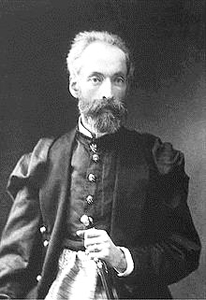
Prince Władysław Czartoryski
Monsieur le Prince,84
I dare not hope that you could remember me, although I had the honor of being presented to you at the Hȏtel Lambert85 during the winter of ’46 by General Zamoyski,86 who (probably as a courtesy) sometimes called me his cousin, in the manner of the Bretons [Brittany, France]. I do not know what he meant by that, but what I do well know of you, Monsieur le Prince, is that you are preeminent among the Poles, in this country and abroad, and consequently our natural guardian. This is why I permit myself the audacity to ask you the favor of forwarding the enclosed letter to his address. This letter is of vital importance to me[,] upon his response depends my health or my condemnation. I am nearly blind and this letter is dictated. You will be so kind as to excuse its imperfection. I do not know the address of the doctor.87 I dare to hope that you will not refuse this service to an old veteran who was a captain of the Fourth Regiment of the Lancers in 1831, and who is today the most humble and most obedient servant of your highness.
![]() Rudolph Korwin Piotrowski
Rudolph Korwin Piotrowski
No. 314 7th Street, San Francisco
California
* * * * * * * *
Acknowledgments:
Letters 1 through 9 were translated from the Polish by Bob Lamming, with Elżbieta Kieszczyńska (Clifton, New Jersey) and edited by Maureen Mroczek Morris (San Francisco) with Roman Włodek (Kraków). The tenth letter was translated from the French by Rita Moran (San Francisco). The authors are immensely grateful for the considerable time and meticulous care given to these translations. Invaluable research assistance was generously provided by our dedicated collaborator in Kraków, Roman Włodek who, with Maureen Mroczek Morris, fact-checked and added context to the letters by consulting many reference books and internet sources. Latin and German phrases were translated by Father Sławomir Nowosad and William “Fred” Hoffman, respectively.
Thanks are due to the Jagiellonian University Library in Kraków for permission to publish the first nine letters. The last letter, addressed to Prince Władysław Czartoryski, is courtesy of the Czartoryski Library in Kraków.
References consulted:
- Rafał Gerber. Studenci Uniwersytetu Warszawskiego 1808-1831. Słownik biograficzny. Wrocław: Zakład Narodowy im. Ossolińskich, Wydawnictwo Polskiej Akademii Nauk, 1977.
- Bibliografia literatury polskiej „Nowy Korbut”, t. 7-9: Irmina Śliwińska i Stanisław Stupkiewicz. Romantyzm. Warszawa: Instytut Badań Literackich Polskiej Akademii Nauk. Państwowy Instytut Wydawniczy, 1968-1972.
- Andrzej Tadeusz Tyszka. Nekrologi „Kuriera Warszawskiego” 1821-1939, t. 1: 1821-1845. Warszawa Biblioteka Publiczna m. st. Warszawy, Biblioteka Główna Województwa Mazowieckiego, 2001 .
- Adam Massalski. Słownik biograficzny. Nauczyciele szkół średnich rządowych męskich w Królestwie Polskim 1833-1962. Kielce: Uniwersytet Humanistyczno-Przyrodniczy Jana Kochanowskiego; Warszawa: Oficyna Wydawnicza Rytm, 2007.
- Wojciech Saletra. Krakowskie i sandomierskie w czas powstania listopadowego. Sandomierz: Wydawnictwo Diecezjalne, 2006.
- Bibliografia literatury polskiej „Nowy Korbut”, t. 12: Irmina Śliwińska, Stanisław Stupkiewicz i Wanda Roszkowska-Sykałowa. Józef Ignacy Kraszewski. Zarys bibliograficzny. Warszawa: Instytut Badań Literackich Polskiej Akademii Nauk; Kraków: Wydawnictwo Literackie, 1966.
- Zbigniew Sudolski. Kompendium biograficzno-informacyjne Wielkiej Emigracji 1831-1900. Warszawa: Ancher, 2011.
- Polski Słownik Biograficzny, 1935- (Obecnie). Warszawa-Kraków: Wydawnictwo Polskiej Akademii Nauk i Polskiej Akademii Umiejętności.
- Rocznik Instytutów Religiynych i Edukacyinych w Królestwie Polskiem. Warszawa: w Drukarni Szkolney, 1824.
- Ryszard Kucha (Ed). (Uniwersytet Marii Curie-Skłodowskiej, Lubelskie Towarzystwo Naukowe). Szkoła czterech wieków. Liceum Ogólnokształcące im. Stanisława Staszica w Lublinie. Lublin: Zakład Komputerowo-Wydawniczy “Laser-Graf”, 1992.
- Barbara Konarska. Polskie Drogi Emigracyjne. Emigranci polscy na studiach we Francji w latach 1832-1848. Warszawa: Państwowe Wydawnictwo Naukowe, 1986.
CR
* * * * * * * *
NOTE: We recently found a letter dated April 10, 1878, written by Rudolf Korwin Piotrowski to Helena Modjeska, and another dated April 16, 1878 from Rudolf Korwin Piotrowski to Modjeska’s husband, Karol Bożenta [Bodzenta] Chłapowski. Also see the letter from Kazimierz Bielawski to Dr. John Strentzel dated December 22, 1880 and the letter from Kazimierz Bielawski to Helena Modjeska dated September 27, 1883. See list of translated letters from California Polanders: http://www.polishclubsf.org/Letters%20translated%20from%20Polish.pdf
* * * * * * * *
- Pan and Pani are Polish titles of respect, and are roughly equivalent to Sir and Ma’am, or Mr. and Ms. ↩
- November Uprising of 1830-31: an armed rebellion in partitioned Poland against the Russian Empire. ↩
- The book title is borrowed from Isaiah 64:16 ↩
- We attempted to preserve the punctuation and layout of the original letters; spelling errors were corrected; breaks in the layout of the text indicate page breaks in the original handwritten letters ↩
- szkoła wojewódzka w Lublinie ↩
- Some records report Piotrowski’s year of birth as 1813 ↩
- Feliks Dysiewicz; master of philosophy; taught ancient literature ↩
- Ludwik Hipolit/Louis Hipolitus (1807-1869); publisher; participated in the November Uprising ↩
- Andrzej Smolikowski; teacher and rector, Szkoły departamentowej i wojewódzkiej w Lublinie ↩
- Ignacy Neuberg; taught Polish history and French ↩
- This is probably from the Latin Vulgate, Ezekiel 25: verse 7 ↩
- The Sejm is the lower house of the Polish parliament. Jan II Kazimierz Waza, king of Poland and grand duke of Lithuania, abdicated the Polish-Lithuanian throne ↩
- Taught Polish literature and history ↩
- Józef Cymerman (also spelled Zimmerman); taught German ↩
- Monsieur Jean Branciard; French teacher ↩
- Seweryn Zdzitowiecki; master of philosophy; taught Polish, chemistry and metallurgy ↩
- Florian Zubelewicz; master of philosophy; taught natural history, geography and geometry ↩
- Franciszek Ostrowski; master of philosophy; taught mathematics and physics ↩
- Ignacy Niedabylski; taught geography ↩
- Henryk Koźmian, Stanisław Egbert Kożmian, Jan Kożmian, Adam Kożmian, Aleksander Kożmian ↩
- Józefat Bolesław, also known as Ibuś, Ostrowski; publisher and political writer ↩
- Apolinary Kowarski: possibly the same man referred to in an 1874 issue of Dziennik Poznański — “Died in Sacramento, California, October 28, 1873. Apolinary Karwowski, son of Piotr and Karolina. He fought in the January Uprising, and later as a captain in the Polish legion during the French-German war (1871). In the bank he had $756.” ↩
- Piotrowski may have written lor or łor for bumpkin, simpleton, peasant ↩
- Piaski, Zimne Doły (Cold Lowlands or Cold Bottomlands) and Wieniawa are districts of Lublin ↩
- These are nicknames. Wiśniak is cherry liqueur and miód is honey mead ↩
- Henryk/Henri Wieniawski: violinist ↩
- Aleksander S. Wołowski; pianist ↩
- Rudolf Korwin Piotrowski’s granddaughters: Suzanne Saint-André (married Leon Eugene Ernest Leps), Yvonne Saint-André (married Léon Auguste Bauche), and Marie Saint-André (married Marie Pierre Diard) ↩
- In 1874 the three granddaughters of Piotrowski were under the age of five. We surmise that he is musing about the brevity of childhood. ↩
- Inferred from context; we suspect that Piotrowski intended to write każesz (you bid) but ran out of space; “if you bid me I will write more” ↩
- Karol Świdziński, a Polish poet and insurgent, was the son of Piotr Świdziński and Filipina Piotrowska. Possibly it was Karol’s sister, or daughter, who was with Korwin at the Lublin school. Karol was also related to Jarosław Dąbrowski, who later married Korwin’s niece, Pelagia Zgliczyńska. ↩
- Franciszek Korycki; military chaplain, November Uprising ↩
- Piotrowski was about 17 years old at the time of the November Uprising ↩
- Major Konstanty Parczewski; leader of the November Uprising in the district of Wilno ↩
- Colonel Antoni Kuszel/Kuszell (1790-1854); led a battalion of mounted riflemen during the November Uprising ↩
- 4th Regiment of the Lancers during the November Uprising ↩
- General Samuel Różycki (1791-1834); officer in the Duchy of Warsaw; joined the insurgents of the November Uprising ↩
- Virtuti Militari; Poland’s highest military decoration for heroism and courage ↩
- Jihlava: city on the historical border between Moravia and Bohemia, now in the Czech Republic ↩
- Paul Demetrius Graf von Kotzebue; governor-general of the Warsaw military district from 1874-1880 ↩
- General Józef Bem; national hero of Poland and Hungary; fought outside Poland’s borders for the future of Poland. The Hungarian Revolution of 1848 was one of the many European revolutions in that year; it grew into a war for independence from Habsburg Austria. Its leaders were Lajos Kossuth, István Széchenyi, Sándor Petőfi and Józef Bem ↩
- Stefania Pelagia Piotrowska Cichorska; wife of Władysław Cichorski ↩
- Editor: ‘46 ↩
- Władysław (Ladislaus) Pawlicki, M.D.; worked as a surgeon in the Russian Navy; president of the Polish Society of California for many years; see: http://www.PolishClubSF.org/Pawlicki.pdf ↩
- December; Piotrowski imposed a Polish genitive ending on this English word ↩
- Railroad cars ↩
- Sir Roger Wentworth Łubieński; belonged to the Polish Society of California in San Francisco, 1873-74; worked for a time as editor of the Overland Monthly using the byline R. W. Lubienski ↩
- Miguel de Cervantes Saavedra; Spanish novelist, poet and playwright ↩
- Pedro Calderón de la Barca y Barreda González de Henao Ruiz de Blasco y Riaño; one of the greatest poets and dramatists of Spain; Piotrowski was obviously amused by the many names claimed by single individuals ↩
- The Polish Society of California in San Francisco, founded in 1863 by Kazimierz Bielawski and Rudolf Korwin Piotrowski; see: http://www.PolishClubSF.org/150%20Years%20Polish%20Society%20of%20California.pdf; and http://www.polishClubSF.org/Bielawski.pdf; and http://www.PolishClubSF.org/Piotrowski%20in%20City%20Directories.pdf ↩
- Aleksander Elgass; taught German in San Francisco; born and died in Lwów; fought in the American Civil War; member of the Polish Society of California in San Francisco; see: http://www.PolishClubSF.org/Elgass.pdf ↩
- Among the most authentically maintained medieval streets in Lublin ↩
- 1814-1893; patron of science; art collector; lived in France from 1831 ↩
- Christmas wafers embossed with religious images; unconsecrated unleavened bread ↩
- Some words are indecipherable in this section ↩
- The most well-known book about early California was written by a “Polander,” Feliks Paweł Wierzbicki. California As It Is, And As It May Be; Or, A Guide to the Gold Region. San Francisco: Washington Bartlett, 1849. First book printed in the English language in California; see http://cosmopolitanreview.com/polish-california/ ↩
- Franciszek (Francis) Teofil Lessen or T. F. Lessen; see: http://www.PolishClubSF.org/Lessen.pdf ↩
- Latin for urgently, instantly, pressingly ↩
- Literally, the Fatherland ↩
- Latin for August ↩
- Literally, the Fatherland ↩
- Zygmunt Kaczkowski. Dzieła. Warszawa, 1874-1875. Literary Works, 11 volumes. Vol. 6: Bajronista (dokończenie). Dziwo-żona, Warszawa, 1874. The Baroness (continued). Demon wife. Warszawa: Nakładem i drukiem, Józefa Ungra, 1874. Dziwożona is a female swamp demon in Slavic mythology known for being malicious and dangerous ↩
- Henryk Rzewuski. Pamiętniki JPana Seweryna Soplicy, cześnika parnawskiego. Memoirs of Mr. Seweryn Soplicy. Poznań: Księgarnia B. Behra, 1844. ↩
- Ignacy Chodźko. Obrazy litewskie: serya trzecia : Pamiętniki kwestarza. Lithuanian Views: The Third Series: Fundraiser’s Memoirs. Wilno: Nakładem i drukiem, J. Zawadzkiego, 1844. In this memoir a monk travels from manor to manor collecting money and food for his monastery ↩
- Polska w czasie trzech rozbiorów 1772-1799: studia do historyi ducha i obyczaju. The Three Partitions of Poland: Study of History and Customs, Volumes 1-3. Poznań: Jan Konstanty Żupański; 1873-1875. ↩
- Exact date deduced from the context of the letter ↩
- Kajetan Suffczyński. Zawsze oni. Obrazy historyczne i obyczajowe z czasów Kościuszki i Legionów (…) z ilustracjami Juliusza Kossaka i epigrafami Wincentego Pola, nigdzie nie drukowanymi. Always Them: Historical Scenes and Customs from the Time of Kościuszko and His Legion. Poznań: Jan Konstanty Żupański, 1875. ↩
- From Chełm (SE of Lublin) which in the 1820s was a separate province but now belongs to the Lublin province. During the Polish-Austrian War of 1809 (the Napoleonic War: a coalition of the Austrian Empire and the United Kingdom against Napoleon’s French Empire and Bavaria) Lublin was part of the Duchy of Warsaw. In 1815 the Congress of Vienna awarded Lublin to Imperial Russia (part of Congress Poland) ↩
- Postal Union Congress, Geneva: http://en.wikipedia.org/wiki/Postal_Union_Congress ↩
- William Chapman Ralston; founder of the Bank of California; his body was found in the San Francisco Bay, due either to a stroke during his regular swim or from suicide ↩
- Vol. 6: See Footnote #61. Vol. 11: Sodalis Marianus (dokończenie). Pogląd krytyczny. Wincenty Korotyński: Zygmunt Kaczkowski, 1875. Marian Sodality (continued). Critical View. Warszawa, 1875. ↩
- Józef Ignacy Kraszewski. Brühl opowiadanie historyczne. Brühl – An Historical Narrative. (vol. 2 of the Saxon Trilogy). Warszawa: Gebethnera i Wolffa, 1874‑1875. Warsaw: Gebethner and Wolff. ↩
- Ibid. Z siedmioletniej wojny: opowiadanie historyczne. The Seven-Years’ War: An Historical Narrative (vol. 3 of the Saxon Trilogy). First Published in 1875 in the monthly “Biblioteka Warszawska”; separately released in 1876 in two volumes ↩
- Ibid. Morituri. The Dying (novel; two volumes). Warszawa, 1875. ↩
- Ibid. Resurrecturi. Resurrection (novel; two volumes). Warszawa, 1876. ↩
- Ibid. Serce i ręka. Heart and Hand (novel; two volumes). Lwów, 1875. ↩
- Ibid. Dziennik Serafiny. Diary of Serafina (novel). Lwów, 1876. ↩
- Cieszkowski Ludwik, Pamiętnik anegdotyczny z czasów Stanisława Augusta, z rękopismu wydany przez J. I. Kraszewskiego. Ludwik Cieszkowski: An Anecdotal Memoir from the Times of Stanisław August from a Manuscript Published by J. I. Kraszewski. Memoirs of Cieszkowski. Poznań, 1867. ↩
- Józef Ignacy Kraszewski. Sceny sejmowe: Grodno 1793. Opowiadanie historyczne przez B. Bolesławitę. Scenes from the Sejm: Grodno 1793. Poznań, 1875. ↩
- Ibid. Jesienią. In the Autumn (novel; two volumes). Warszawa, 1876. ↩
- Ibid. Radziwiłł w gościnie: anegdota dramatyczna w 3 aktach. Of Prince Radziwiłł as a Guest: An Anecdotal Drama in 3 Acts. Lwów, 1872. ↩
- Ibid. Ostatnie chwile księcia wojewody. His Final Hours (novel). Warszawa, 1875. ↩
- Frisco: slang for San Francisco; see http://www.cosmopolitanreview.com/dont-call-it-frisco ↩
- Prince Władysław Czartoryski (1828-1894); Polish noble, political activist in exile, collector of art, and founder of the Czartoryski Museum in Kraków ↩
- Hȏtel Lambert: a grand mansion on the Ȋle Saint-Louis in Paris. In the 19th century, “Hôtel Lambert” came to designate a political faction of Polish exiles associated with Prince Adam Jerzy Czartoryski (father of Władysław) who purchased the Hôtel Lambert in 1843 ↩
- Count Władysław Stanisław Zamoyski (1803-1868); Polish nobleman, politician, and general ↩
- Dr. Ksawery Gałęzowski; ophthalmologist; Rue Dauphine 67, Paris, France ↩

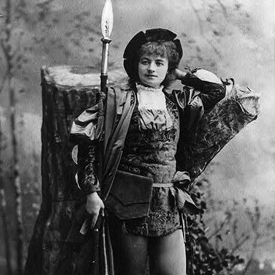
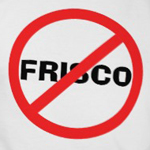

Pingback: Welcome to our Summer 2014 issue!
Well done. CR is impressive. And so is your scholarship about Korwin. I liked the graphics too.
At the very beginning of your article, your description under an example of Korwin’s penmanship reads, “In his florid penmanship, Korwin writes, “Szanowny Panie Ignacy!” (Respected Mr. Ignacy!). I would ask you to reinspect that line and see that it actually reads, “KOCHANY Panie Ignacy!” Please correct me if my visual interpretation is wrong.
Thanks, Carla! You are correct!
What an interesting piece. Thanks to the authors/editors and translators for bringing it to the electronic “pages” of the CR.
Pingback: Welcome to Summer 2015!
Recently visited the Henryk Sienkiewicz museum in Poznan. I was not paying close enough attention to remember everything, but there was a mention of a person in San Francisco that was used as the model for Zagłoba.
Yes! Rudolf Korwin Piotrowski